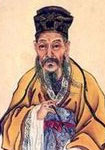新秋雨夜西斋文会
新秋雨夜西斋文会朗读新秋雨夜西斋文会。宋代。梅尧臣。夜色际阴霾,灯青谢客斋。梧桐生静思,绛纬动秋怀。小酌宁辞醉,清言不厌谐。谁怜何水部,吟苦怨空阶。
《新秋雨夜西斋文会》是宋代梅尧臣创作的一首诗词。下面是诗词的中文译文、诗意和赏析:
中文译文:
夜幕蔽天,阴霾密布,灯光昏暗中,客斋静静地谢绝了宾客。梧桐树生长在寂静中,引发我深深的思考;纱帘微动,引发我对秋天的思念。我不愿意喝得醉醺醺,只想小酌一番;清新的言谈使我愉悦,不觉得厌倦。但是,谁会关心作为官员的我,我在孤寂的阶梯上吟唱,表达着我内心的苦闷和怨愤。
诗意和赏析:
这首诗词以秋天的夜晚为背景,表达了诗人梅尧臣在阴暗的夜色中感受到的孤寂和忧愁。整首诗词通过对客斋、梧桐树、纱帘、饮酒和言谈等元素的描绘,展现了诗人内心的情感和思考。
诗词开篇以夜幕蔽天、阴霾密布的景象,烘托出一种沉闷和压抑的氛围。客斋灯光昏暗,谢绝了宾客,使得诗人感到孤独和寂寞。接着,诗人描述了梧桐树的生长和纱帘微动,表达了他内心的思考和对秋天的思念。梧桐树生长在寂静中,可能引发诗人对生命和人生的思考,而纱帘的微动则象征着秋天的到来,进一步唤起了诗人对秋天的情感和回忆。
在这样的夜晚,诗人不愿意喝得醉醺醺,只想小酌一番。这表现了诗人对于安静和淡雅的追求,也折射出他对于人生的态度。清新的言谈使诗人感到愉悦,不觉得厌倦。这种清言谈可能是指与志同道合的朋友交流,或者是与自己内心对话的方式,使诗人得到一种宣泄和抚慰。
最后两句表达了诗人的苦闷和怨愤。诗人自称“何水部”,指的是他作为官员的身份,但却感受到了孤独和被忽视的痛苦。他在空阶上吟唱,寄托了他内心的苦闷和怨愤,同时也显露出对于社会的不满和对命运的抱怨。
总体来说,这首诗词以细腻的笔触描绘了一个秋天夜晚的景象,通过对客斋、梧桐树、纱帘、饮酒和言谈等元素的描绘,展现了诗人内心的情感和思考。诗人表达了对孤独和寂寞的感受,对秋天的思念,对清新的言谈的愉悦,以及对社会和命运的不满和怨愤《新秋雨夜西斋文会》is a poem written by Mei Yaochen during the Song dynasty. Here is the Chinese translation of the poem, followed by an analysis of its meaning and appreciation:
Translation:
Amidst the dark night, obscured by haze,
The lamp's dim light fades in the western studio, bidding farewell to guests.
The parasol tree grows in silence, inspiring contemplation,
The crimson silk stirs, evoking autumn's sentiments.
I prefer a modest drink, not seeking intoxication,
Clear words bring harmonious joy, never tiresome.
Who will sympathize with this humble Water Bureau official,
Singing bitter complaints alone on empty steps?
Meaning and Analysis:
This poem portrays the sense of solitude and melancholy experienced by the poet, Mei Yaochen, on an autumn night. Through the depiction of various elements such as the guest studio, the parasol tree, the moving silk curtain, and the act of drinking and conversing, the poet reveals his inner emotions and contemplation.
The poem begins with a description of the night sky covered by darkness and haze, creating a gloomy and oppressive atmosphere. The dim light of the lamp in the guest studio suggests the poet's feelings of loneliness and solitude. Next, Mei Yaochen describes the growth of the parasol tree and the slight movement of the silk curtain, expressing his contemplation and longing for autumn. The parasol tree growing in silence may trigger the poet's reflections on life and existence, while the movement of the silk curtain symbolizes the arrival of autumn, further stirring the poet's emotions and memories associated with the season.
On such a night, the poet prefers a modest drink instead of getting drunk. This indicates his pursuit of tranquility and elegance and reflects his attitude towards life. The pleasure derived from clear and harmonious conversation brings the poet joy that never becomes tiresome. This could refer to the poet engaging in conversations with like-minded friends or engaging in inner dialogue as a means of catharsis and solace.
The last two lines express the poet's bitterness and resentment. The poet refers to himself as "this humble Water Bureau official," highlighting his identity as a government official who feels the pain of loneliness and neglect. By singing bitter complaints alone on empty steps, the poet expresses his inner anguish and grievances, while also revealing his discontent with society and fate.
Overall, this poem delicately depicts an autumn night scene. Through the portrayal of the guest studio, the parasol tree, the silk curtain, drinking, and conversation, the poet reveals his inner emotions and contemplation. Mei Yaochen expresses his feelings of solitude and loneliness, longing for autumn, the joy derived from clear conversation, as well as his dissatisfaction and resentment towards society and fate.
梅尧臣
梅尧臣(1002~1060)字圣俞,世称宛陵先生,北宋著名现实主义诗人。汉族,宣州宣城(今属安徽)人。宣城古称宛陵,世称宛陵先生。初试不第,以荫补河南主簿。50岁后,于皇祐三年(1051)始得宋仁宗召试,赐同进士出身,为太常博士。以欧阳修荐,为国子监直讲,累迁尚书都官员外郎,故世称“梅直讲”、“梅都官”。曾参与编撰《新唐书》,并为《孙子兵法》作注,所注为孙子十家著(或十一家著)之一。有《宛陵先生集》60卷,有《四部丛刊》影明刊本等。词存二首。...
梅尧臣。梅尧臣(1002~1060)字圣俞,世称宛陵先生,北宋著名现实主义诗人。汉族,宣州宣城(今属安徽)人。宣城古称宛陵,世称宛陵先生。初试不第,以荫补河南主簿。50岁后,于皇祐三年(1051)始得宋仁宗召试,赐同进士出身,为太常博士。以欧阳修荐,为国子监直讲,累迁尚书都官员外郎,故世称“梅直讲”、“梅都官”。曾参与编撰《新唐书》,并为《孙子兵法》作注,所注为孙子十家著(或十一家著)之一。有《宛陵先生集》60卷,有《四部丛刊》影明刊本等。词存二首。
猜你喜欢
高家铺。明代。黄英。边塞寒笳晚更哀,布衣谁识陇西才。行依道北左公柳,春断江南驿使梅。战罢沙虫悲士卒,嘘同野马息尘埃。壮怀不醉凉州酒,为辅河湟政教来。
柬友人 其二。明代。吴与弼。贫居尽日掩柴关,黄卷青灯不敢閒。克己转知前日妄,希贤愈觉古人难。
咏真乐 其一。元代。李道纯。佛仙总是世人为,争奈迷途自不知。若匪贪名争计较,定须逐利苦奔驰。波波漉漉担家业,劫劫忙忙赡妇儿。假使财荣妻貌美,无常到后岂相随?
卅年冒宠玷朝班,诏许全家返故关。善饭尚夸身手健,恋恩先怅鬓毛斑。
年来衣食皆天赐,老去林泉得自闲。万里栖霞知好在,只愁无计买青山。
道光壬午五月自曹镇任奉命致仕返黔俶装将行赋长句四章敬以纪恩兼用志别 其一。清代。刘清。卅年冒宠玷朝班,诏许全家返故关。善饭尚夸身手健,恋恩先怅鬓毛斑。年来衣食皆天赐,老去林泉得自闲。万里栖霞知好在,只愁无计买青山。
送朱先生北上。明代。朱谏。谢公亭下大江流,子晋箫台落叶秋。九月菊花开满路,一天明月照孤舟。小姬度曲还倾酒,佳客看山独倚楼。楩梓定为廊庙器,老夫自合住丹丘。
秋晚信州推院亲友或责无书,即事寄答。唐代。韩琮。官信安仁拙,书非叔夜慵。谬驰骢马传,难附鲤鱼封。万里劳何补,千年运忝逢。不量横草力,虚慕入云踪。洁水空澄鉴,持铅亦砺锋。月寒深夜桂,霜凛近秋松。宪摘无逃魏,冤申得梦冯。问狸将挟虎,歼虿敢虞蜂。商吹移砧调,春华改镜容。归期方畹积,愁思暮山重。仙鼠犹惊燕,莎鸡欲变蛩。唯应碧湘浦,云落及芙蓉。
送夏侯审校书东归。唐代。钱起。楚乡飞鸟没,独与碧云还。破镜催归客,残阳见旧山。 诗成流水上,梦尽落花间。傥寄相思字,愁人定解颜。
太虚亭望金陵亭在摄山绝顶。明代。于慎行。孤亭高倚暮云秋,平楚苍苍望石头。紫气微分双阙影,白云中断大江流。萧森落木来悲气,迢递青山入壮游。王业千年根本在,燕吴两地对皇州。
永遇乐(甲午走笔和岳大用梅词韵)。宋代。赵师侠。秋满衡皋,淡云笼月,晚来风劲。一抹残霞,数声过雁,还是黄昏近。凭高临远,倚楼凝睇,多少断愁幽兴。听渔村、鸣榔隐隐,别浦暮烟收暝。湘妃起舞,芳兰纫佩,约略乱峰云鬓。景物悲凉,楚天澄淡,过尽归帆影。斜阳低处,远山重叠,萧树乱鸦成阵,空无言,栏干凭暖,闷怀似困。
永王东巡歌·其二。唐代。李白。三川北虏乱如麻,四海南奔似永嘉。但用东山谢安石,为君谈笑净胡沙。
绍兴以后祀五方帝六十首 其三 白帝降神用《高安》。。宋代。郊庙朝会歌辞。昊天之气,揫敛万汇。涓日洁齐,有严厥祀。有牲维肥,有酒维旨。神之燕娭,锡兹福祉。
风雨过武夷山。宋代。陈宓。我与兹山是故人,十年相别意弥真。如何咫尺迷风雨,刚道情亲却不亲。
浣溪沙十一首 其九。清代。史承谦。一幅生绡玉不如。帘波的的见唇朱。相思飘满莫愁湖。应是情多频掷眼,何妨载去共当垆?别来曾否忆人无。
